
Romanian Agricultural Research
Scope & Guideline
Exploring Agronomy to Enhance Global Practices
Introduction
Aims and Scopes
- Crop Genetics and Breeding:
Research in this area includes the evaluation and development of new crop varieties, focusing on traits such as yield potential, disease resistance, and adaptability to climatic conditions. The journal regularly features studies on the genetic improvement of major crops like maize, wheat, and sunflower. - Sustainable Agricultural Practices:
This includes research on organic farming, integrated pest management, and the use of biological fertilizers. The journal emphasizes studies that explore eco-friendly practices that enhance productivity while minimizing environmental impacts. - Soil and Crop Management:
Studies examining soil health, fertility management, and the impact of tillage practices on crop yields are prominent. The journal addresses the relationships between soil properties, crop performance, and sustainable land management. - Environmental and Climate Resilience:
Research focusing on the impacts of climate change on agriculture, including the development of climate-resilient crops and adaptive management strategies to mitigate risks associated with changing climatic conditions. - Agroecological Research:
This area includes studies that examine biodiversity, agroecosystem dynamics, and interactions between crops and pests, providing insights into maintaining ecological balance in agricultural landscapes.
Trending and Emerging
- Climate-Smart Agriculture:
There is an increasing focus on research that addresses the impacts of climate change on agriculture, including studies on climate-resilient crops and adaptive management strategies. This trend is critical as agriculture faces the dual challenges of food security and climate variability. - Precision Agriculture Technologies:
Emerging studies on the application of digital technologies, data analytics, and precision farming techniques are becoming more prevalent. These technologies aim to optimize resource use and improve crop management efficiency. - Soil Health and Microbial Diversity:
Research that delves into soil microbiomes and their role in promoting soil health and crop productivity is gaining traction. This reflects a broader trend towards understanding the complex interactions within agroecosystems. - Integrated Crop-Livestock Systems:
There is a noted increase in research exploring the synergies between crop and livestock production systems, aiming for more sustainable and productive agricultural practices. - Biotechnology in Crop Improvement:
The journal is seeing more studies focused on biotechnological approaches, including genetic engineering and molecular markers, to enhance crop traits such as drought tolerance and disease resistance.
Declining or Waning
- Traditional Pest Control Methods:
There has been a noticeable reduction in the frequency of studies focused solely on conventional chemical pest control methods. This decline may indicate a shift towards more sustainable and integrated pest management approaches that prioritize ecological balance. - Single Crop Systems:
Research focused on monoculture practices appears to be waning, as there is a growing emphasis on crop rotations, intercropping, and diversification to enhance resilience and sustainability in agricultural systems. - Basic Soil Chemistry Studies:
While soil health remains a critical area of study, basic research on soil chemistry without a direct application to crop management or sustainability is becoming less common, giving way to more applied and integrative research approaches.
Similar Journals
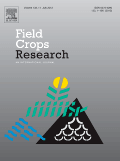
FIELD CROPS RESEARCH
Pioneering Discoveries in Agronomy and Soil ScienceFIELD CROPS RESEARCH is a premier academic journal published by Elsevier, dedicated to advancing knowledge in the fields of Agronomy and Crop Science as well as Soil Science. Now in its 46th year of publication, this esteemed journal has established itself as a leading resource, holding a prestigious Q1 ranking in both the Agronomy and Soil Science categories, with a remarkable blend of rigorous peer-reviewed research and innovative findings. With a Scopus ranking of #27/406 in Agronomy and #20/159 in Soil Science, and a notable 93rd and 87th percentile respectively, FIELD CROPS RESEARCH plays a vital role in informing practices that drive sustainable agriculture and optimize crop production. Although not an open access journal, it remains highly accessible to the global research community and offers critical insights that influence policy and agricultural practices worldwide. Researchers, professionals, and students are encouraged to delve into this journal, as it continues to shape the future of field crop research through impactful studies and comprehensive reviews.
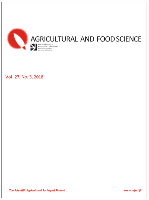
AGRICULTURAL AND FOOD SCIENCE
Championing sustainable solutions in agriculture and food sciences.AGRICULTURAL AND FOOD SCIENCE is a prestigious journal published by the SCIENTIFIC AGRICULTURAL SOCIETY OF FINLAND, dedicated to advancing knowledge in the fields of agricultural and food sciences. With an ISSN of 1459-6067 and E-ISSN of 1795-1895, this open-access journal has been providing valuable insights and research findings since its inception in 2002. As of 2023, it holds a Q3 ranking in Food Science and is positioned at the 46th percentile within its Scopus category, ranking 210 out of 389 journals in Agricultural and Biological Sciences – Food Science. The journal features contributions from a global network of researchers, covering various topics including sustainable agricultural practices, food safety, and innovative food technologies. Based in Finland, the journal serves as an essential platform for scholars, professionals, and students who are committed to enhancing food security and agricultural productivity through rigorous scientific research. The convergence of interdisciplinary studies from 2004 to 2024 marks a critical evolution in the scope of agricultural and food research, making this journal a vital resource for anyone involved in these dynamic fields.

Crop Forage & Turfgrass Management
Transforming agricultural landscapes with impactful insights.Crop Forage & Turfgrass Management, published by WILEY, serves as an essential platform for researchers, professionals, and students in the fields of agronomy, crop science, plant science, and soil science. With a focus on advancing knowledge in the management of crops, forage systems, and turfgrass, this journal plays a pivotal role in disseminating innovative research and practical applications that drive agricultural sustainability and productivity. Despite its Q3 ranking in various agricultural and biological science categories according to Scopus, it aims to enhance its impact and relevance in the academic community through high-quality publications. As a journal converged from 2015 to 2024, it invites contributions that address contemporary challenges and solutions in crop management, ensuring accessibility to vital knowledge for the advancement of agricultural practices. Situated in the United States, it also reflects the diverse agricultural landscapes and practices of the region, making it a valuable resource for a global audience.
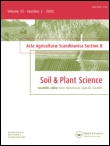
ACTA AGRICULTURAE SCANDINAVICA SECTION B-SOIL AND PLANT SCIENCE
Advancing Sustainable Agriculture Through Soil and Plant ScienceACTA AGRICULTURAE SCANDINAVICA SECTION B-SOIL AND PLANT SCIENCE, published by Taylor & Francis AS, is a distinguished journal dedicated to the fields of Agronomy, Crop Science, and Soil Science. With an impressive impact factor, and categorized in Q2 for both Agronomy and Crop Science and Soil Science as of 2023, this journal is an essential resource for researchers, professionals, and students aiming to advance their understanding of soil-plant interactions and sustainable agricultural practices. Operating since 1992 and continuing through to 2024, ACTA aims to publish high-quality, peer-reviewed research that encourages the applicability of advanced scientific knowledge in real-world agricultural settings. While the journal is not open access, it remains widely accessible through institutional subscriptions, reflecting its commitment to disseminating essential findings and fostering innovation in soil and plant science worldwide. Nestled in the vibrant academic environment of Norway, ACTA AGRICULTURAE SCANDINAVICA serves as a key platform for nurturing groundbreaking research that informs sustainable agricultural policies and practices globally.

Revista de Agricultura Neotropical
Unlocking the Potential of Tropical Crop ManagementRevista de Agricultura Neotropical, published by UNIV ESTADUAL MATO GROSSO SUL, serves as a pivotal platform for disseminating research in the fields of agronomy and crop science. Since its inception as an open-access journal in 2014, it has been dedicated to promoting innovative research and practical applications within the agricultural sector, specifically tailored to the challenges and dynamics of the tropical agriculture landscape in Brazil and beyond. Although currently positioned in the Q4 quartile of Scopus rankings, and with a modest agricultural science percentile, the journal actively encourages contributions that highlight sustainable agricultural practices, tropical crop management, and emerging technologies in farming. With its commitment to open access, the Revista de Agricultura Neotropical broadens the reach of critical knowledge, making it accessible to researchers, professionals, and students alike, thus fostering a collaborative environment for advancing agri-scientific initiatives.
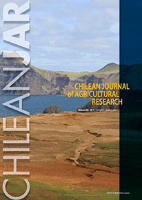
Chilean Journal of Agricultural Research
Advancing agricultural knowledge for a sustainable future.Chilean Journal of Agricultural Research, published by INST INVESTIGACIONES AGROPECUARIAS - INIA, is a premier academic journal dedicated to the advancement of knowledge in the fields of Agronomy, Crop Science, Animal Science, and Zoology. With an ISSN of 0718-5839, this journal serves as a vital resource for researchers, professionals, and students alike, facilitating the dissemination of impactful research from Chile and around the globe. Classified as a Q2 journal in both Agronomy and Crop Science and Animal Science and Zoology as of 2023, it occupies a significant position in academic rankings, highlighted by its Scopus metrics, which recognize its contributions to the field. The journal operates under an Open Access model, ensuring that valuable research is accessible to a wider audience, thereby promoting innovation and collaboration. With a converged publication timeline from 2008 to 2024, the Chilean Journal of Agricultural Research continues to enhance understanding and foster advancements in agricultural science, thus playing an instrumental role in addressing contemporary challenges in food security and sustainable practices.

INDIAN JOURNAL OF AGRICULTURAL SCIENCES
Fostering collaboration for sustainable agricultural practices.Welcome to the Indian Journal of Agricultural Sciences, a vital resource for researchers and professionals in the field of agricultural sciences, published by the esteemed Indian Council of Agricultural Research. Established in 1974, this journal aims to disseminate high-quality research and developments in agronomy and crop science, facilitating knowledge exchange and advancement within the agricultural community. Though currently classified in the Q4 category according to 2023 data, it provides an essential platform for publication, contributing valuable insights towards sustainable agricultural practices. With an ISSN of 0019-5022 and an E-ISSN of 2394-3319, the journal houses important research that spans decades of convergence and collaboration, promoting innovation in agriculture across India and beyond. As an open access platform, it invites contributions that reflect a wide array of agricultural disciplines to foster sustainable food systems that address the challenges of food security. Join the network of scholars and practitioners by sharing your research and engaging with the profound work being done in this transformative field.
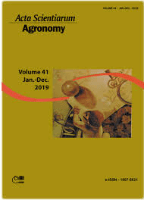
ACTA SCIENTIARUM-AGRONOMY
Advancing agricultural knowledge for a sustainable future.ACTA SCIENTIARUM-AGRONOMY is a prestigious, peer-reviewed journal published by UNIV ESTADUAL MARINGA, PRO-REITORIA PESQUISA POS-GRADUACAO, focusing on advanced research in the field of agronomy and crop science. Since its inception as an Open Access journal in 2007, it has significantly contributed to disseminating high-quality research, allowing unrestricted access to its content for a global audience. Operating from Brazil, the journal holds a notable Q2 category ranking in Agronomy and Crop Science as of 2023, validating its importance within the academic community. The journal’s Scopus ranking positions it in the 49th percentile among Agricultural and Biological Sciences, indicating a robust foundation for impactful research. With a commitment to innovation and scientific excellence, ACTA SCIENTIARUM-AGRONOMY aims to provide researchers, professionals, and students with vital insights that drive forward our understanding of agriculture and its environmental implications.

Ciencias Agronomicas
Unleashing insights for resilient farming practices.Ciencias Agronomicas is a prominent academic journal dedicated to the field of agricultural sciences, published by the Universidad Nacional de Rosario's Faculty of Agricultural Sciences in Argentina. This journal aims to foster innovative research and disseminate knowledge across various disciplines within agronomy, including crop production, soil health, pest management, and sustainable farming practices. Although it currently operates without an open access model, it plays a vital role in advancing agricultural research and contributing to global food security challenges. Through rigorous peer-review and the publication of high-quality articles, Ciencias Agronomicas serves as an essential resource for researchers, agronomists, and students seeking to stay informed about the latest developments and breakthroughs in the agronomic sciences. With its commitment to excellence and relevance, this journal stands as a critical platform for the dissemination of impactful research in agriculture.

Agrivita
Empowering researchers to cultivate groundbreaking agricultural insights.Agrivita is a distinguished, open-access journal dedicated to advancing research and knowledge in the fields of Agronomy and Crop Science. Published by Brawijaya University, Faculty of Agriculture, this journal has been providing a platform for high-quality scholarly articles since 2010. Located in the vibrant country of Indonesia, Agrivita plays a vital role in the exchange of innovative agricultural research, particularly within the Southeast Asian context. As of 2023, it holds a respectable Q3 ranking in its category, showcasing its commitment to scholarly excellence and visibility. With an increasing impact on the academic community, and its current Scopus rank placing it in the 48th percentile, Agrivita stands as a crucial resource for researchers, professionals, and students eager to deepen their understanding of crop science and agronomy. The journal's scope encompasses cutting-edge research that addresses both fundamental and applied aspects of agriculture, ensuring it remains relevant to today's pressing agricultural challenges. Its open access model enhances global accessibility, fostering a collaborative environment where diverse opinions and findings can converge.